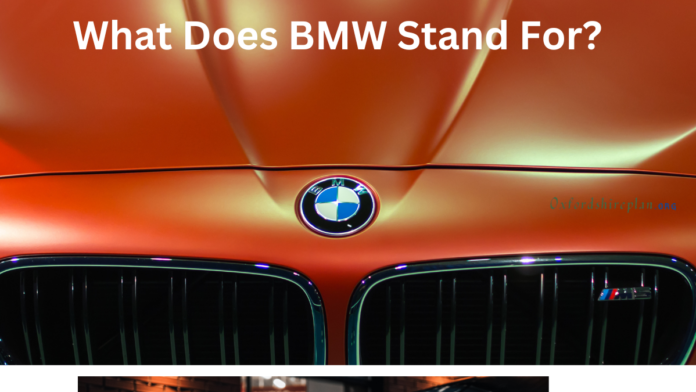Ever wondered what does BMW stands for? Well, BMW stands for Bayerische Motoren Werke, which translates from German to Bavarian Motor Works in English. This name points to its origins in the Bavarian region of Germany. The company was founded in 1916, originally focusing on the production of aircraft engines during World War I.
After the war, as restrictions were imposed by the Treaty of Versailles, BMW shifted its focus from aircraft engines to other production areas, including motorcycles and automobiles. Here is comple detail on what does BMW stand for, its history and future outlook.
Contents
- History
- Rebuilding and Innovation in the Post-War Era
- Establishment as a Global Luxury Brand
- Current Endeavors and Future Outlook
- Conclusion
- Frequently Asked Questions
- When was BMW founded?
- What does BMW stand for?
- What was the first car made by BMW?
- What are BMW’s current focuses in automotive technology?
- Is BMW involved only in car production?
- Read More:
History
BMW’s motorcycle production began in 1923 with the R32, which was well-received for its innovative engine and brake design. By the late 1920s, BMW had started automobile production as well, acquiring the Fahrzeugfabrik Eisenach which produced the Dixi 3/15, BMW’s version of the Austin 7.
This move marked BMW’s significant entry into the automobile industry, which would become its primary business focus.
During the 1930s, BMW gained recognition for its luxury sports cars, and its advanced aircraft engines once again became important as Europe moved toward World War II. Post-war, the company faced numerous challenges, including factory destruction and restrictions on production capacities.
Rebuilding and Innovation in the Post-War Era
The rebuilding phase in the 1950s was challenging for BMW. The company struggled financially and almost succumbed to a takeover by Mercedes-Benz. However, strategic decisions and new management helped BMW stabilise.
The introduction of the BMW 501, a luxury sedan, and later the success of the compact BMW Isetta microcar helped rejuvenate the company’s finances and re-establish its market position.
The 1960s saw BMW’s return to strength with the launch of the New Class sedans, which were compact, sporty, and featured modern engineering such as disc brakes and independent suspension. These vehicles were pivotal in defining BMW’s identity as a manufacturer of sporty yet elegant cars.
Establishment as a Global Luxury Brand
Through the 1970s and 1980s, BMW solidified its reputation as a luxury automaker with the introduction of the 3 Series, 5 Series, and 7 Series cars. Each of these series catered to different market segments but maintained the core attributes of performance and luxury.
The company’s emphasis on engineering excellence and driving performance attracted a loyal customer base, positioning BMW as a major player in the global automotive market.
Innovation has remained a cornerstone of BMW’s strategy. The company has consistently introduced new technologies including fuel injection, turbocharged engines, and advanced vehicle electronics throughout its history.
In the late 20th and early 21st centuries, BMW also began focusing on sustainability, introducing electric and hybrid models such as the BMW i3 and i8.
Current Endeavors and Future Outlook
Today, BMW is not just an automaker; it has expanded its portfolio to include MINI and Rolls-Royce, and it continues to lead in the development of premium electric and autonomous vehicles.
The company’s strong emphasis on design, technology, and sustainability signals its commitment to remaining at the forefront of the automotive industry.
BMW also emphasises corporate responsibility and sustainability, adopting innovative methods to reduce its environmental impact across the lifecycle of its vehicles, from production to end-of-life recycling.
Conclusion
From its origins in the production of aircraft engines to its present status as a global icon of luxury and performance in the automotive industry, BMW has demonstrated resilience and adaptability.
The abbreviation BMW encapsulates a legacy of quality, innovation, and excellence in engineering that continues to drive the company into the future.
Frequently Asked Questions
When was BMW founded?
BMW was founded in 1916.
What does BMW stand for?
BMW stands for Bayerische Motoren Werke or Bavarian Motor Works in English.
What was the first car made by BMW?
The first car made by BMW was the BMW Dixi, based on the Austin 7.
What are BMW’s current focuses in automotive technology?
BMW is currently focusing on electric vehicles, autonomous driving technology, and sustainable production practices.
Is BMW involved only in car production?
No, BMW also produces motorcycles and owns the MINI and Rolls-Royce car brands.
Read More:
- Joey Essex Finally Speaks Out as Ex Grace Explodes at Luca on Love Island All Stars
- What Is a Movie Grid and How Does It Work?
- Why Did Sharona Leave Monk?
- How to Apply For the EU Settlement Scheme?
- UC Universal Credit United Kingdom Log In – Check Now

I am a dedicated lifestyle and fashion enthusiast, always looking for the latest trends and timeless styles. With a flair for creativity and a passion for self-expression, I provide fresh insights and tips on elevating everyday living and personal style.
















